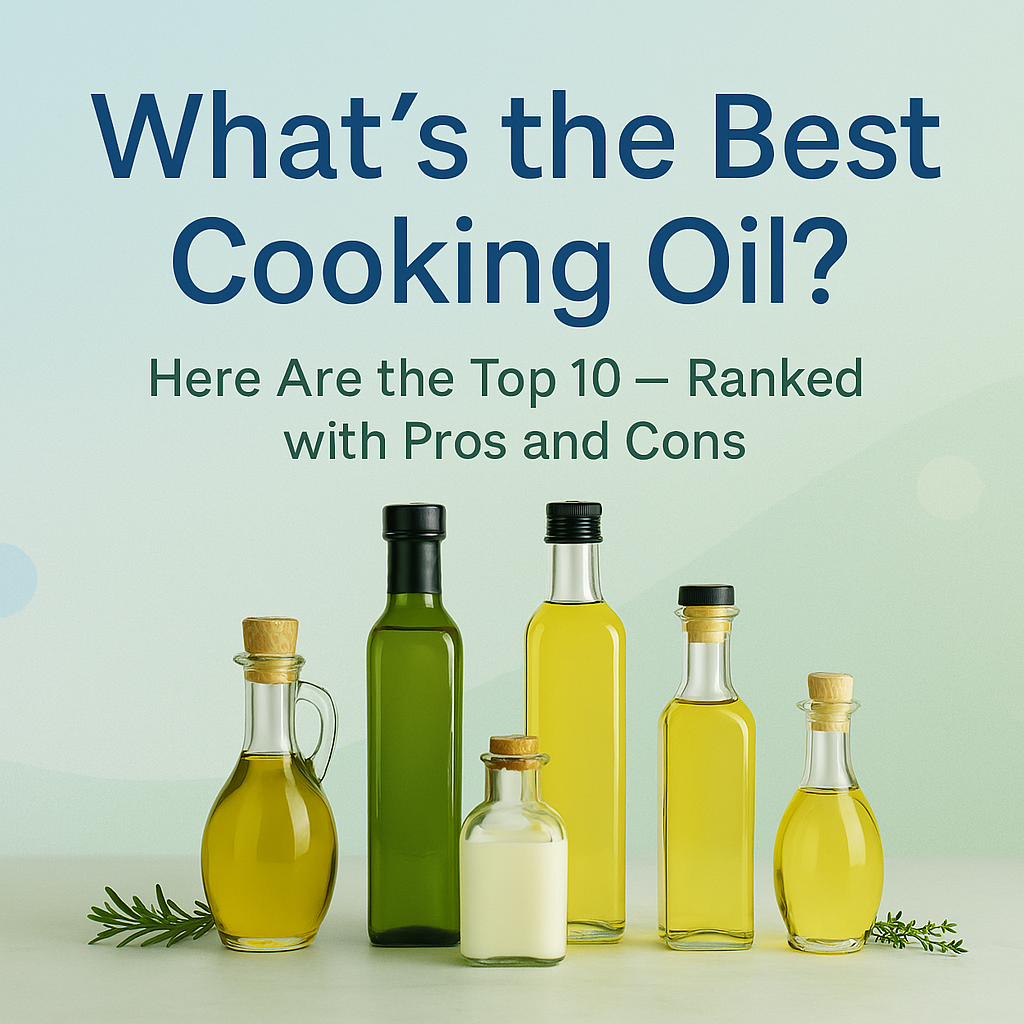
The 10 Healthiest Cooking Oils (Ranked for 2025) — And Why One Outperforms Them All
Share
Are you confused about which cooking oil is actually best for your health? You're not alone. "What's the healthiest cooking oil?" remains one of Google's most-searched food questions—and with good reason.
Studies show that the oil you choose affects everything from heart health and inflammation to brain function and longevity. But with dozens of options crowding supermarket shelves, making the right choice can feel overwhelming.
In this comprehensive guide, we'll cut through the marketing hype and rank the top 10 cooking oils based on scientific research, examining their health benefits, drawbacks, and ideal uses. By the end, you'll know exactly which oil deserves a permanent spot in your kitchen.
Why Your Cooking Oil Choice Matters More Than You Think
Before diving into our rankings, it's important to understand why oils differ so dramatically in their health effects:
- Omega-6 to Omega-3 ratio - This balance directly impacts inflammation levels in your body
- Antioxidant content - Determines how well the oil resists oxidation (which creates harmful compounds)
- Smoke point - Affects how the oil behaves when heated and whether it produces toxic byproducts
- Processing methods - Influence nutrient retention and potential contamination
Now, let's examine the top contenders:
1. Extra Virgin Olive Oil (EVOO)

Pros:
- Rich in heart-healthy monounsaturated fats
- Contains powerful antioxidants called polyphenols
- Extensively researched and backed by Mediterranean diet studies
- May help reduce inflammation and improve cholesterol levels
Cons:
- High omega-6 content can block omega-3 absorption
- Lacks omega-3 fatty acids required for optimal brain health
- Lower smoke point makes it less suitable for high-heat cooking
- Quality varies significantly between brands
Best uses: Salad dressings, low-heat sautéing, dipping
2. Avocado Oil

Pros:
- High smoke point (520°F/270°C) makes it versatile for various cooking methods
- Rich in monounsaturated fats similar to olive oil
- Pleasant buttery taste that complements many dishes
- Contains lutein for eye health
Cons:
- Significantly more expensive than other cooking oils
- Contains almost no omega-3 fatty acids
- Often refined unless specifically labelled "extra virgin"
- Studies show many commercial brands are adulterated
Best uses: High-heat cooking, stir-frying, grilling
3. Coconut Oil

Pros:
- Stable at higher temperatures due to saturated fat content
- Contains medium-chain triglycerides (MCTs) that may support metabolism
- Popular in ketogenic and paleo dietary approaches
- Pleasant tropical flavour for certain recipes
Cons:
- Extremely high in saturated fats (over 80%)
- May raise LDL (bad) cholesterol levels in some individuals
- Provides no omega-3 benefits or significant antioxidants
- Research on health benefits remains mixed and controversial
Best uses: Baking, medium-heat cooking, tropical dishes
4. Butter

Pros:
- Rich, familiar flavour that enhances most dishes
- Contains fat-soluble vitamins (A, D, E, K)
- Less processed than many industrial seed oils
- Contains beneficial compounds when from grass-fed sources
Cons:
- High saturated fat content may concern those monitoring cholesterol
- Contains no omega-3 fatty acids or plant antioxidants
- Not suitable for vegan diets
- Can contribute to inflammation when consumed in excess
Best uses: Baking, finishing dishes, low-heat cooking
5. Rapeseed Oil (Canola)

Pros:
- Neutral flavour makes it versatile for various recipes
- Contains relatively high amounts of plant-based omega-3 (ALA)
- Affordable and widely available
- Relatively high smoke point
Cons:
- Typically genetically modified and highly refined
- Poor in antioxidants and beneficial polyphenols
- ALA omega-3s convert poorly to DHA/EPA forms needed by the body
- Still maintains an imbalanced omega-6 to omega-3 ratio
- Often undergoes chemical extraction processes
Best uses: Baking, general cooking, when a neutral flavour is needed
6. Sunflower Oil

Pros:
- High smoke point suitable for higher-heat cooking
- Light taste that doesn't overpower other ingredients
- Widely used in commercial food production
- Inexpensive and readily available
Cons:
- Extremely high in inflammatory omega-6 fatty acids
- Contains virtually no omega-3s or beneficial compounds
- Often heavily refined and processed
- May contribute to chronic inflammation when used regularly
Best uses: Occasional high-heat cooking when neutral flavour is required
7. Flaxseed Oil

Pros:
- Exceptionally high in plant-based omega-3 (ALA)
- Potential benefits for heart health and inflammation
- Vegan-friendly source of essential fatty acids
- Works well in cold applications like dressings
Cons:
- Extremely perishable and must be refrigerated
- Cannot withstand any heat - cooking destroys beneficial properties
- ALA omega-3s convert poorly to DHA/EPA forms needed by the body
- Bitter taste can be off-putting to some
Best uses: Cold applications only - salad dressings, drizzling, supplements
8. Ghee (Clarified Butter)

Pros:
- High smoke point suitable for various cooking methods
- Distinctive rich, nutty flavour enhances many dishes
- Contains fat-soluble vitamins and beneficial fatty acids
- Lactose-free option for those with mild dairy sensitivities
Cons:
- High in saturated fats
- Contains no omega-3 fatty acids
- Not suitable for vegan diets or those with dairy allergies
- More calorie-dense than many liquid oils
Best uses: High-heat cooking, sautéing, Indian and South Asian cuisine
9. Algae Oil (DHA-specific)

Pros:
- Plant-based source of DHA omega-3 fatty acids
- Vegan alternative to fish oil supplements
- Potential benefits for brain and heart health
- Sustainable production compared to fish oils
Cons:
- Typically sold as a supplement rather than cooking oil
- Poor absorption unless paired with specific antioxidants
- Highly susceptible to oxidation
- Limited culinary applications
Best uses: Supplementation, not typically used for cooking
10. InflammaFree Premium DHA & Polyphenol-Enriched Olive Oil

Pros:
- Perfect 1:1 omega-6 to omega-3 ratio - ideal for anti-inflammatory diets
- Synergistic combination of EVOO's polyphenols with DHA-rich algae oil
- Polyphenols protect omega-3s from oxidation and enhance absorption
- Delicious taste with no fishy aftertaste
- Consolidates multiple supplements into one convenient product
- 100% plant-based, sustainable, and certified vegan
Cons:
- Not suitable for high-temperature frying (like most nutritionally valuable oils)
- Premium price point — though it replaces multiple products, making it more cost-effective over time
- Newer to market compared to traditional options
Best uses: Everyday cooking, salad dressings, finishing dishes, brain and heart health support
The Verdict: Which Oil Deserves a Place in Your Kitchen?
If you're simply looking for something to cook with and aren't particularly concerned about health effects, most oils will suffice for basic culinary needs.
However, if you're investing in your long-term health and want an oil that actively supports brain function, reduces inflammation, and protects heart health, InflammaFree stands in a category of its own.
Why InflammaFree Outperforms Traditional Options:
- It solves the omega imbalance problem - Most people consume far too many omega-6s and not enough omega-3s, creating chronic inflammation. InflammaFree's perfect 1:1 ratio addresses this fundamental issue.
- It provides synergistic benefits - The polyphenols in olive oil protect the DHA omega-3s from oxidation while enhancing their absorption - a benefit you can't get from taking olive oil and omega-3 separately.
- It simplifies your routine - Rather than juggling multiple oils and supplements, InflammaFree delivers complete nutritional support in one delicious product.
- It tastes amazing - Unlike fish oil supplements or algae oils, there's no unpleasant aftertaste - just the clean, fresh flavour you expect from premium olive oil.
InflammaFree at a Glance:
- Supports brain health
- Balances inflammation
- 100% vegan & plant-based
- Delicious taste, no fishy flavour
- One oil. Zero compromise
Take Action: Upgrade Your Oil, Upgrade Your Health
The oil you use daily might seem like a small decision, but its cumulative effect on your health is profound. Every meal is an opportunity to either fight inflammation or fuel it.
Ready to make the switch to the most advanced cooking oil available today? Visit InflammaFree.com to learn more about how this revolutionary product is changing how health-conscious consumers think about cooking oils.
Your brain, heart, and body deserve better than ordinary oil. They deserve InflammaFree.
Note: Always consult with your healthcare provider before making significant dietary changes, especially if you have existing health conditions.
This article was last updated on 7 April 2025, and reflects the most current nutritional research available on cooking oils and their health effects.
